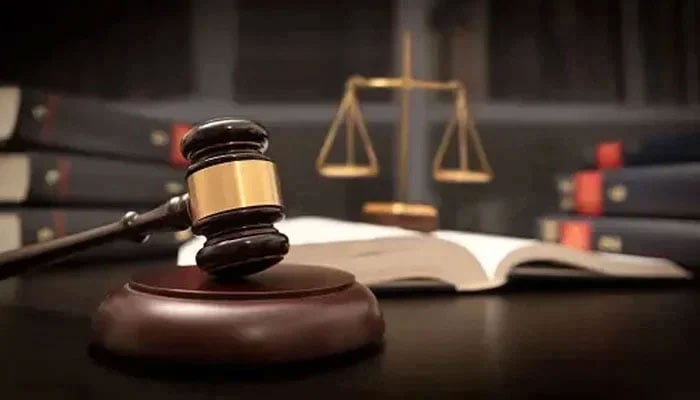Rule of law?
Pakistan lags severely in areas essential to a functioning society – civil and criminal justice, fundamental rights
Pakistan’s modest rise from 130th to 129th in the World Justice Project’s (WJP) Rule of Law Index 2024 is a glimmer of hope for the country’s legal landscape. Yet, a closer look at the data reveals a troubling narrative. The ranking, though improved, does little to mask the stark reality: Pakistan lags severely in areas essential to a functioning society – civil and criminal justice, fundamental rights, open government, and security. Ranked fifth out of six countries in the region, Pakistan’s performance highlights how the country’s rule of law remains vulnerable, wavering in the face of political instability and institutional overreach. The decade-long history of Pakistan’s rule of law scores tells a story of promise and decline. Following the restoration of democracy in 2008, Pakistan’s indicators showed gradual improvement, with notable progress in law and order, fundamental rights, and economic stability by 2015. A post-Musharraf Pakistan saw stability emerging from the aftermath of years of military rule, the burden of terrorism, and a struggling economy. But the positive trajectory did not last. Political manipulation, institutional infighting, and short-sighted power plays unraveled the progress painstakingly built over years.
In 2018, Pakistan embarked on an experiment referred to as the ‘hybrid regime’. Ostensibly led by civilian politicians, this model leaned heavily on the support of non-representative institutions, orchestrated in an attempt to reshape the political landscape. The judiciary’s politicisation, a crackdown on dissent, and the selective application of justice became the defining features of this era. The hybrid project, under the then-ruling party, destabilised Pakistan economically, politically, and legally, as civil liberties and democratic norms steadily eroded. Politicians were stripped of legitimacy, dissenting voices in the media were silenced, and a culture of fear reigned supreme. These power struggles have left an indelible impact on Pakistan’s governance and law. With deep divisions between the executive and judiciary, coupled with institutional overreach, the country’s rule of law has become fragile, lacking the stability that democratic norms should guarantee. This chronic uncertainty has permeated civil and criminal justice, hindering any meaningful progress in combating corruption, ensuring transparency, or protecting fundamental rights.
This year’s marginal improvement in Pakistan’s global ranking underscores that even after five years of declining scores, there is potential to reclaim the path to better governance. However, the path forward requires a commitment from all institutions to function within their constitutional mandates, respecting boundaries that safeguard democratic integrity and rule of law. The recent clash between the executive and judiciary only emphasises how rule of law is contingent on institutional restraint – a restraint that has been alarmingly absent in recent years. If Pakistan is to break free from this cycle, it is imperative for all political forces to prioritise a shared vision for stability over partisan gains. The hybrid model’s failures must serve as a stark lesson: when rule of law is subordinated to political engineering, the entire nation bears the consequences. Moving forward, politicians and the judiciary alike must focus on rebuilding trust and reestablishing the pillars of justice and democracy. By doing so, Pakistan can hope not only to climb the ranks in global indices but to foster a nation where justice, transparency, and democracy are respected cornerstones rather than elusive ideals.
-
 Ryan Coogler Shares Thoughts About Building Community Of Actors Amid 'Sinners' Success
Ryan Coogler Shares Thoughts About Building Community Of Actors Amid 'Sinners' Success -
 Heidi Klum Gushes Over Diplo Collab 'Red Eye' Despite DJ Falling Asleep During Video
Heidi Klum Gushes Over Diplo Collab 'Red Eye' Despite DJ Falling Asleep During Video -
 Israel Behind Majority Of Journalist Deaths Worldwide, Watchdog Claims
Israel Behind Majority Of Journalist Deaths Worldwide, Watchdog Claims -
 'It Would Become A Circus' : Inside Jane's Turmoil For 'little Sister' Fergie Whose Hidden From The World
'It Would Become A Circus' : Inside Jane's Turmoil For 'little Sister' Fergie Whose Hidden From The World -
 Inside Cardi B's Real Feelings Related To Stefon Diggs Split Post One Year Of Romance
Inside Cardi B's Real Feelings Related To Stefon Diggs Split Post One Year Of Romance -
 Former Sri Lankan Intelligence Chief Arrested Over 2019 Easter Bombings
Former Sri Lankan Intelligence Chief Arrested Over 2019 Easter Bombings -
 Kristen Bell Shares One Rule For 'SAG' Awards Ceremony That She Will Ditch This Time: 'Happy And Fun'
Kristen Bell Shares One Rule For 'SAG' Awards Ceremony That She Will Ditch This Time: 'Happy And Fun' -
 Woman Suing Meta Platforms, YouTube Over Social Media Addiction Sticks To Claims After Trial
Woman Suing Meta Platforms, YouTube Over Social Media Addiction Sticks To Claims After Trial -
 Shakira Applauded For 'gracious' Behaviour By Fans As She Blends Work With Family Downtime
Shakira Applauded For 'gracious' Behaviour By Fans As She Blends Work With Family Downtime -
 Mexico’s President Considers Legal Action Over Elon Musk Cartel Remark
Mexico’s President Considers Legal Action Over Elon Musk Cartel Remark -
 Prince William Hits The Roof With The Andrew Saga Bleeding Into Earthshot
Prince William Hits The Roof With The Andrew Saga Bleeding Into Earthshot -
 HBO Gives Major Update About 'Industry' Season Five And Show's End
HBO Gives Major Update About 'Industry' Season Five And Show's End -
 Donnie Wahlberg Responds To 'Boston Blue' Backlash: 'Nobody Was More Disappointed Than Me'
Donnie Wahlberg Responds To 'Boston Blue' Backlash: 'Nobody Was More Disappointed Than Me' -
 Jennifer Garner Gets Emotional Over Humble Career Start: 'It Makes Me Want To Cry'
Jennifer Garner Gets Emotional Over Humble Career Start: 'It Makes Me Want To Cry' -
 Princess Beatrice Told An Acquaintance That She ‘likes’ Jeffrey Epstein: Grim Verdict Drops
Princess Beatrice Told An Acquaintance That She ‘likes’ Jeffrey Epstein: Grim Verdict Drops -
 Late Katherine Short's Neighbours Give Insights Into Her 'peace Loving' Personality Post Suicide
Late Katherine Short's Neighbours Give Insights Into Her 'peace Loving' Personality Post Suicide




